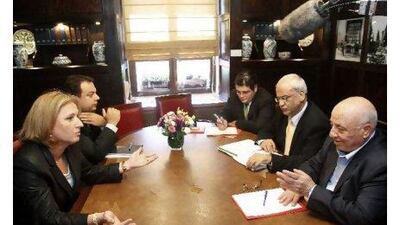NAZARETH // For more than a decade, since the collapse of the Camp David talks in 2000, the mantra of Israeli politics has been: "There is no Palestinian partner for peace."
Yesterday, the first of hundreds of leaked confidential Palestinian documents seemed to show that the rejectionists in the peace process have been on the Israeli, not Palestinian, side.
The most revealing papers, jointly released by Al Jazeera television and Britain's Guardian newspaper, date from 2008, the most hopeful period in the recent negotiations between Israel and the Palestinians.
At the time, Ehud Olmert was Israel's prime minister and had publicly committed himself to pursuing an agreement on Palestinian statehood. He was backed by the US administration of George W Bush, which had revived the peace process in late 2007 by hosting the Annapolis conference.
In those favourable circumstances, the papers show, Israel spurned a set of major concessions the Palestinian negotiating team offered over the next months on the most sensitive issues in the talks.
Yesterday, Mahmoud Abbas, the Palestinian Authority president, tried to deny the documents' veracity. Israeli officials failed to come to his aid; Avigdor Lieberman, the far-right foreign minister, spoke of the leaked papers as genuine.
According to the documents, the most significant Palestinian compromises were on Jerusalem.
During a series of meetings over the summer of 2008, Palestinian negotiators agreed to Israel annexing large swaths of East Jerusalem, including almost all of the city's Jewish settlements and parts of the Old City itself.
It is difficult to imagine how the resulting patchwork of Palestinian enclaves in East Jerusalem, surrounded by Jewish settlements, could ever have functioned as the capital of the new state of Palestine.
At the earlier Camp David talks, according to official Israeli documents leaked to the Haaretz daily in 2008, Israel had proposed something similar: Palestinian control over what were then termed "bubbles" in East Jerusalem.
The Palestinians also appeared willing to renounce their claim to exclusive sovereignty over the Old City's flashpoint of the Haram al Sharif, the sacred compound that includes Al Aqsa mosque and is flanked by the Western Wall. Israel proposed shared oversight instead.
This was probably the biggest concession of all, Sovereignty of the Haram was the issue that "blew up" the Camp David talks, according to an Israeli official who was present.
Saeb Erekat, the PLO's chief negotiator, is quoted as promising Israel "the biggest Yerushalayim in history" - using the Hebrew word for Jerusalem - as his team effectively surrendered Palestinian rights enshrined in international law.
The concessions reportedly did not end there, however. The Palestinians agreed to use land swaps to accommodate 70 per cent of the half a million Jewish settlers in the West Bank and East Jerusalem and to forgo the rights of the overwhelming majority of Palestinian refugees. The Palestinian state was also, it seems, to be demilitarised.
Interestingly, the Palestinian negotiators are said to have agreed to recognise Israel as a "Jewish state", a concession Israel now claims is one of the main stumbling blocks to a deal.
In an apparent betrayal of promises made to the leaders of Israel's 1.4 million Arab citizens, the Palestinian negotiators at one point accepted a land swap transferring a small area of Israel densely populated with Palestinians into the new Palestinian state. This deal echoes a controversial "population transfer" plan long proposed by Mr Lieberman.
The "Palestine Papers", as they are being called, also suggest a re-evaluation is necessary of two key assumptions made by the international community about the peace process.
The first relates to the United States' self-proclaimed role as honest broker. What shines through the documents is the reluctance of US officials to put reciprocal pressure on Israeli negotiators, even as the Palestinian team make major concessions on core issues.
The second is the assumption that the peace process has fallen into abeyance chiefly because of the election nearly two years ago of a right-wing government under Benjamin Netanyahu, who has drawn international criticism for refusing to pay more than lip-service to Palestinian statehood.
The Americans put pressure unsuccessfully on Mr Netanyahu, in the early stages of his premiership, to include in his coalition Tzipi Livni, leader of the centrist opposition party Kadima and widely regarded as the most credible Israeli advocate for the peace process.
However, Ms Livni, who was previously Mr Olmert's foreign minister, emerges in the leaked papers as an inflexible negotiator, dismissive of the concessions being made by the Palestinians. At a key moment, she turns down the Palestinians' offer, after saying: "I really appreciate it."
The sticking point for Ms Livni was a handful of West Bank settlements the negotiators refused to cede to Israel. The Palestinians have long complained that the two most significant - Maale Adumim, outside Jerusalem, and Ariel, near the Palestinian city of Nablus - would effectively cut the West Bank into three cantons, undermining any hopes of territorial contiguity.
Ms Livni's insistence on holding on to these settlements, after all the Palestinian compromises, suggests that no Israeli leader is likely to be prepared to reach a deal unless the Palestinians cave in to almost every Israeli demand.
One of the Palestine Papers quotes an exasperated Mr Erekat asking a US diplomat last year: "What more can I give?"
The man with the answer may be Mr Lieberman, who unveiled his map of Palestinian statehood this week. It conceded a provisional state on less than half of the West Bank.


